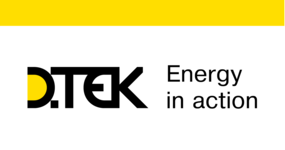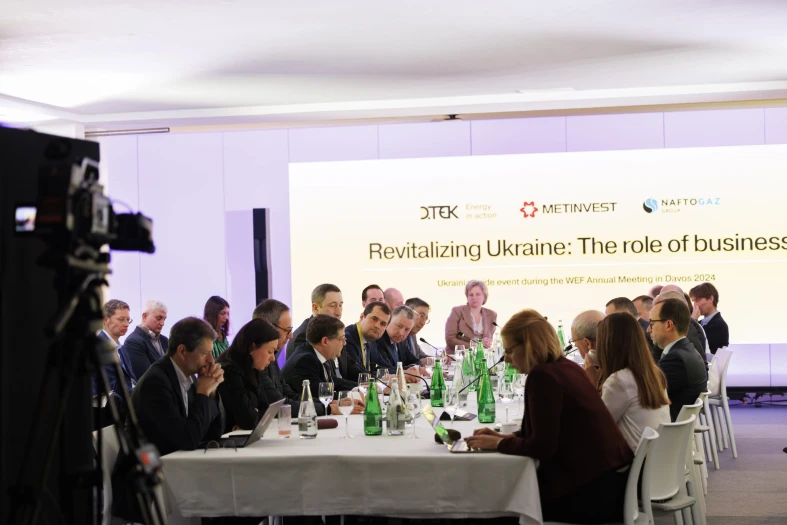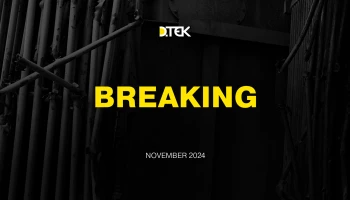Ukraine’s DTEK on Wednesday urged global decision makers at the World Economic Forum in Davos to step up the defence of Ukraine’s economy by creating the conditions for private capital to flow into the country and spark an economic fightback.
DTEK, the country’s largest private energy producer, is calling on foreign investors, international financial institutions (IFIs) the Ukrainian Government and its companies to reinvigorate the private sector through a series of concrete measures and reforms to strengthen its economy. At a special session at the World Economic Forum in Davos dedicated to revitalising Ukrainian business, participants set out a new manifesto to get capital flowing again, after a two year investment hiatus.
After shirinking by 29% in 2022, Ukraine’s GDP is expected to recover by around 5 percent in 2023 and to raise that figure even higher, capital injections are needed across potentially hundreds of major private sector projects. For the past two years, foreign inflows of capital almost entirely centred on support for government, or government-owned, institutions.
Speaking at a special event focused on revitalising Ukrainian business at the World Economic Forum in Davos, DTEK CEO Maxim Timchenko said: ”Defending our economy is one of the crucial ways to win this war. Ukraine has the companies in place to do that, with large-scale, bankable projects. But now we need the capital to execute and this is where we need help from governments and international financial institutions. Ukrainian businesses have learnt how to survive through war and to build back with ingenuity and determination. Now we ask the IFIs to direct funding flows beyond state-owned companies. It’s time to turn to the private sector to restart the Ukrainian economy.”
The WEF session titled Revitalising business brought together figures including Deputy Head of the Office of the President of Ukraine Rostyslav Shurma, DTEK CEO Maxim Timchenko, Naftagaz CEO Oleksiy Chernyshov, former US Ambassador to NATO Kurt Volker, economist and author Anders Aslund, Horizon Capital’s Vasile Tofan and Blue Bay Senior EM Sovereign Strategist Timothy Ash who moderated the session.
WATCH REVITALISING UKRAINE: THE ROLE OF BUSINESS THROUGH THIS LINK
In a 12-point manifesto generated through the discussion, participants called for rapid action from a broad range of stakeholders, including the following:
To foreign governments and international financial institutions (IFIs)
1. Raise funding targets in the provision of capital to private Ukrainian businesses. Today a clear majority of funding to Ukraine from IFIs such as the EBRD goes to public institutions or state-backed companies.
2. Expand dialogue with private Ukrainian businesses and bring more international companies to Ukraine. Use mechanisms such as pitching sessions to match those who have capital with those who need it.
3. Create an investment task force and secretariat to coordinate domestic and global efforts to revitalise the Ukrainian business that could convene discussion at the annual Ukraine Recovery Conference (this year in Berlin).
4. Use more blended financial instruments backed by governments, IFIs and credit export agencies to decrease investor risk and therefore create a funding bridgehead through which far larger volumes of private capital are deployed.
5. Support Ukraine militarily, including NATO membership, thereby minimising the risk premium for international investors.
To global investors and foreign companies
6. Secure first mover advantage and assess opportunities now, without necessarily needing to commit significant funds or people, in country.
7. Build relationships with Ukrainian partners who have on-the-ground experience and knowledge of the local regulations and markets.
8. Work with Ukrainian businesses outside Ukraine to strengthen understanding and build relationships.
To the Ukrainian Government and domestic businesses
Use this moment to accelerate reforms and market liberalisation – deepening and widening the much-welcome current reform agenda, for example:
9. Modify wartime capital control mechanisms to enable private companies to access international capital markets and service external debts.
10. Ease the ban on exports such as gas and oil exports – done in a way that still protects Ukraine’s strategic supply but offers access opportunities to increase foreign earnings.
11. Align with Europe in terms of market pricing and market coupling, thus accelerating the country’s integration with EU markets.
12. Strengthen corporate governance to give investors added assurance and to build trust.






